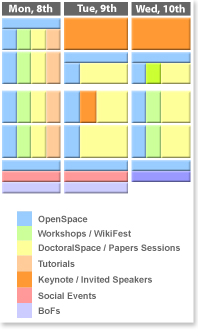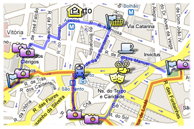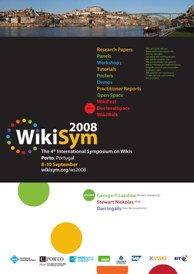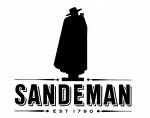From WikiSym 2008
The subject was the project at http://www.omegawiki.org which is a dictionaries and thesaurus of words and meanings in many many languages. It can assist with precise translation, centering around definitions of meanings. It is managed by OpenProgress and supported by WikiProfessional.
People
Six people came.
- Daniel Kinzler [1] did the demo and led discussion. He is a longtime Mediawiki developer from Germany and connected to OpenProgress (a not-for-profit institution in the Netherlands). He wrote his master thesis on extraction a multilingual thesaurus from Wikipedia (the WikiWord software) and is working on importing this thesaurus into OmegaWiki. Daniel will be working for Wikimedia Germany e.V. starting in October.
- Ana and her colleague came from SAPO in Portugal which is working on an encyclopedia to be written strictly in European Portuguese. An issue for them is that wikipedia is dominated by Brazilian Portuguese (because the Portuguese empire was so big; which is a problem it is too late now to fix). And Ana is still looking for a "really good" dictionary between European Portuguese and English.
- Willfried works for a bearing manufacturer which wants to have a precise controlled technical vocabulary across languages.
- Peter took notes for this wiki (which may have errors; please fix as needed) and runs sites with terms definitions for economics research and plans to do similar things at the government statistics bureau where he works in the U.S. He has an interest translation across between fields of study and also between natural languages.
- Anke Reinhold is a computer science graduate student from Germany doing research on semantic wikis in social science for the German Institute for International Educational Research.
Notes from the event
The user interface offers a rapid definition of the meanings of a word. In the meeting Daniel showed the German word "Pferd", for which three English meanings were offered: "horse", "knight" (in chess), and "pommel horse" -- each hyperlinked to a deeper English definition. For each meaning, we could get a list of possible translations across more than a dozen languages, in one long list, each of which was a hyperlink.
There are not many users yet. It is possible to make an edit in a wiki way (though we did not do it on the spot) The user must register first before contributing.
Sources There are many language wiktionaries. Omegawiki is an effort to make a user interface that makes them all available in a unified way and to assist rapid translation. It is meant to be concept-centered and multilingual. It is a structured wiki, with database attributes for search and sorting and reporting, currently using the WikiData extension. It draws data from many sources, including wiktionaries and wikipedia. Both software and content are under a free license.
Within some areas, taxonomies apply directly and are used to offer information. A term may be known to be in a "class" whose members have formal attributes. For example, in most uses a "horse" is an "animal" and the information immediately available in Omegawiki's answer today includes common attributes of animal such as terms for its species and related terms for this animal's juvenile, male, and female versions. And with the participation of [| WikiProfessional] there are or will be medical terminologies to which well-defined taxonomies and ontologies apply.
Future versions Many many things are anticipated and discussed for future versions:
- Sharper conceptual distinction between "terms" and "concepts which terms refer to" -- a subject of Daniel's expertise.
- An API for web programmers who wish to make requests to get translation, hyphenation, pronunciation, and such info and maybe etymology (word history and ancestry).
- A live network of databases in which structured databases of terminology were maintained in a decentralized ("distributed") way, perhaps by specialists, which OmegaWiki could draw from in real time or by snapshots. For example, WikiProfessional has medical expertise and terminology databases, and when such databases are incorporated into the system it will be possible to offer sharp and smart services on the spot with high confidence (e.g. a definitive, not-probabilistic, translation, and links to relevant pages).
- One request especially from Willfried was that one possible translation should be explicitly recommended by the software. A direct use/need for this is in his business which requires a common precise technical vocabulary, which is or shall be documented in databases that he or his colleagues will create and which could conceivably feed into OmegaWiki's offering of translations (terminology management, controlled vocabulary).
- A related possibility (from Peter) would be to offer a % likelihood of the best-match given the available information. In the example given, it is plain that (say) 95% likely that the best-fit for the immediate user of "Pferd" is simply "horse" and the underlying data could make this inference and deliver this information along with the alternatives. WikiWord could provide such percentages even per meaning.
- Pronunciation and sound files could be available for many terms in many languages. This would be nice for learning to use the term (or learning the language the term is in).
- More capability to ask for a possible translations without specifying the language of the original term (which may not be known or which may be ambiguous).
- Offer definitions of the searched terms in the second language using words from the first language and vice versa.
Invitation to wikisym Please create an account and play with OmegaWiki and send comments and bug reports to the developers.
Daniel's agenda and notes
- preferred terms (also deprecated terms)
- fallbacks for "sub-languages" / variants
- usage notes
- terms should not link to wikipedia, meanings should. terms can link to wiktionary
- UI for translators -> babelwiki worshop session





























